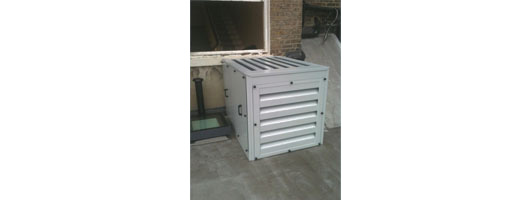Company details for:
Sound Planning Ltd

25A Vicarage Hill,
Lower Bourne,
Farnham,
Surrey,
GU10 3QS,
United Kingdom
Quick Links:
Products / Services
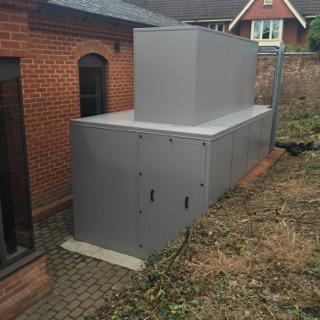
Acoustic Enclosures & Sound Enclosures
> Chillers
> Engine test rooms
> AC units
> Industrial equipment
> Generators
> Fans
> Plant rooms
Acoustic Enclosure Benefits
Designed to meet client and local authority noise reduction targets, the features of an Acoustic Enclosure include:
> Polyester powder painted to any standard BS or RAL colour
> Suitable for outdoor and indoor applications
> Acoustic panels and doors for servicing access
>Facilitates airflow as well as reducing noise
>Secure and tamperproof
> Full design installation services
Acoustic Enclosure Components
Acoustic enclosures help to reduce noise pollution from heavy plant work and machinery without affecting the efficiency of standard operations.
Main components:
> Acoustic panels
> Acoustic louvres
> Attenuators
> Acoustic doors/panels
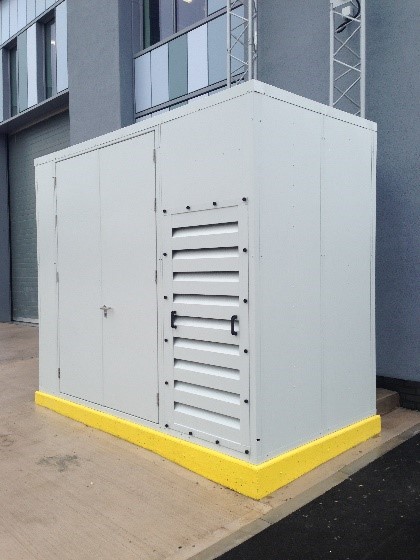
Compressor & Generator Enclosures
> Acoustic louvre service doors (single/double)
> Solid acoustic panel doors (single/double)
> Access panels
> Exhaust air attenuators (high performance)
> Painted to BS or RAL
> Weather louvres/cowls
> Facilitates airflow
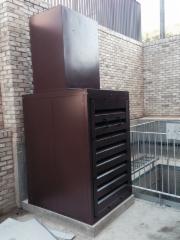
Air Source Heat Pump (ASHP) Enclosures (Vertical Exhaust)
> Front access panel
> Intake air acoustic louvre
> High performance vertical exhaust air attenuators
> Painted to BS or RAL
> Additional absorptive panels for improved performance
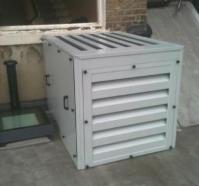
Air Source Heat Pump (ASHP) Enclosures (Horizontal Exhaust)
> Access panels front and side
> High performance acoustic louvres
> Painted to BS or RAL
> Absorptive panels for reduced internal reverberation
> Timber cladding (available on request)
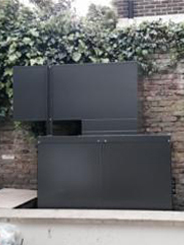
Bespoke Acoustic Enclosure Design (90 Degree Exhaust Attenuator)
> Bend exhaust attenuator with radius bend (height restriction)
> High performance acoustic louvre air inlet
> Painted to BS or RAL
> Internal absorption panels for reduced internal reverberant build up
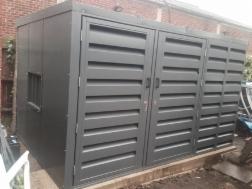
Air Compressor Acoustic Housing − Acoustic Plant Room
> High performance acoustic louvre air inlet
> Exhaust air attenuator (left hand side of enclosure)
> Double access/service doors (lockable)
> Painted to BS or RAL
> Internal absorption
> Roof with a fall back to front
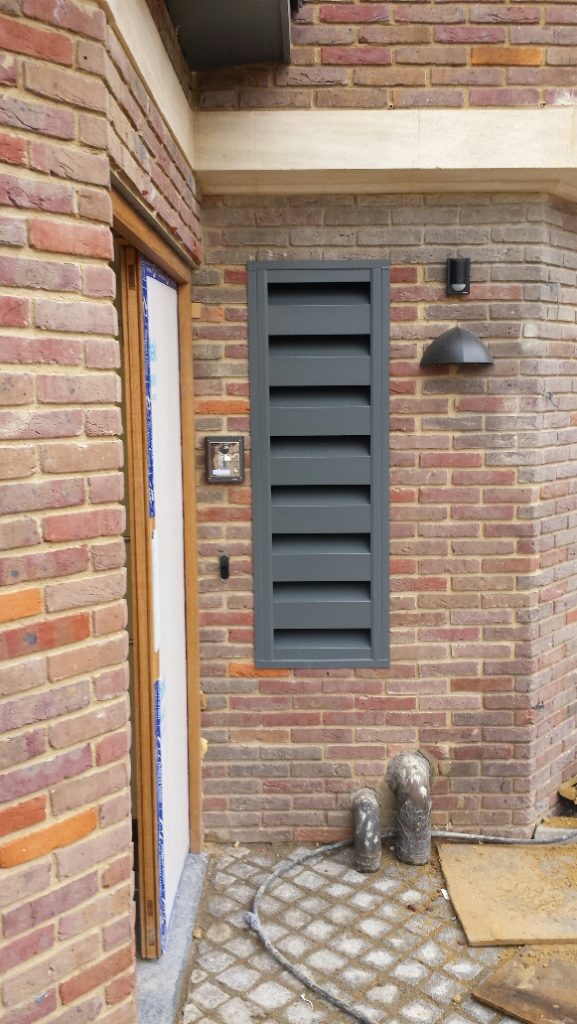
Acoustic Louvres for Heating, Ventilation & Air Conditioning Noise Solutions
Acoustic louvres provide attenuation (noise reduction) whilst maintaining required air flow, please call our engineers to assist in your acoustic louvre design queries.
> Typically used in building openings, they reduce airborne noise while allowing continued airflow
> They are also used as acoustic screens around mechanical plants where equipment requires airflow
Tested in the laboratory facilities at Salford University, which is accredited by UKAS (United Kingdom Accreditation Service), a Sound Reduction Index (SRI) for each louvre type can be published upon request.
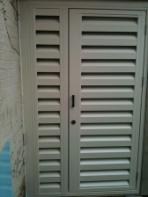
Acoustic Louvre Doors
> Lockable hardware
> 150mm to 300mm depth
> Box section frame
> Painted in RAL or BS
> Hinged on either side
> Installation services
> Noise calculation services
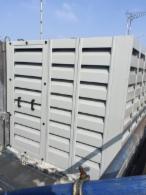
Acoustic Louvre Screens
> AC plant screens
> Generator screens
> Chiller screens
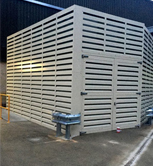
Acoustic Screens
With different acoustic screen options, you can choose from the following:
> Freestanding or supported
> Permanent, temporary or easily removed from a mounted position
> Placed at ground level or used in different applications (i.e. roof mounted plants)
> BS or RAL painted
Acoustic screens afford the following benefits:
> Customisable to any length, height, shape or design
> Suitable for either indoor or outdoor applications
> Easy to clean and maintain
> Durable and weatherproof
> Cost effective noise reduction solution
> High levels of acoustic performance
Our acoustic screens are suitable for:
> Industrial plants and machinery
> Mechanical plants
> Workshops
> Chillers
> Generators
> Factories
> External AC units
> Condensers
> Compressors
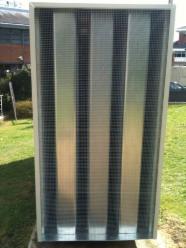
Attenuators
The attenuator acoustic design is governed by various parameters such as source noise levels, system losses, distances, noise criteria, etc. Understanding the importance of assessing the most economic unit to meet the proper noise criteria, we also consider the practicalities of the ductwork system.
In order to optimise the design, Sound Planning uses HVAC software to analyse the system requirements and plan the appropriate attenuators.
Options
Due to the diverse range of projects undertaken, attenuator construction also includes a wide range of options that can fully cater to various specifications.
Circular Silencer
The circular silencer range is typically used in ductwork systems, where it can be duct mounted or bolted directly onto the fan − if size allows.
Depending on the acoustic requirements, circular attenuators can incorporate a central ‘pod’ that can increase the acoustic performance in terms of insertion loss − attenuators without a pod can only offer acoustic performance at minimal resistance to airflow.
Cross-Talk
Cross-talk attenuators are selected using our calculation software − to help determine the necessary insertion losses, whilst maintaining low system pressure drops (a pre-requisite at this point in the system). This range can either be of rectangular or circular construction.

Acoustic Walls
Applications
Our acoustic walls can be applied to lightweight wall structures or existing plasterboard. They are also ideal for existing walls that have failed pre-completion testing or as a solution to noisy neighbours.
Our acoustic walls are suitable for:
> Recording and broadcast studios
> Offices and office pods
> Conference rooms
> Home theatres or opera houses
> Schools and libraries
> Auditoriums and gymnasiums
> Nightclubs and bars
> Hospitals
Sound Insulation
Adhering to Approved Document E of the Building Regulations Act 2000, our acoustic walls can provide adequate insulation from noises that come from neighbouring or connecting buildings − within a residential environment, common internal parts of a building or in school areas.
Specification
Composition 15mm acoustic layer laminated to:
5mm acoustic board
Board size 1200mm x 1200mm
Thickness 27.5mm
Part E Reg 43dB
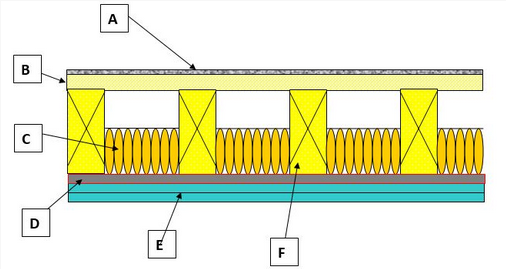
Acoustic Floors
Showcasing a new and simple method of achieving up to 90 minutes integrity and sound insulation, they also meet the correct airborne and impact requirements of the new Approved Document Part E of the Building Regulations Act.
Our acoustic floors are suitable for new builds or the refurbishment/ conversion of different buildings such as:
> Houses
> Flats
> Offices
> Shops
> Hotels
> Nursing homes
> Museums and libraries
> Schools
> Churches
> Theatres
> Shopping centres
> Oil refineries
Advantages
> Durable construction
> Excellent acoustic performance
> Aesthetic value
> Tarnish proof
> Stress-free maintenance
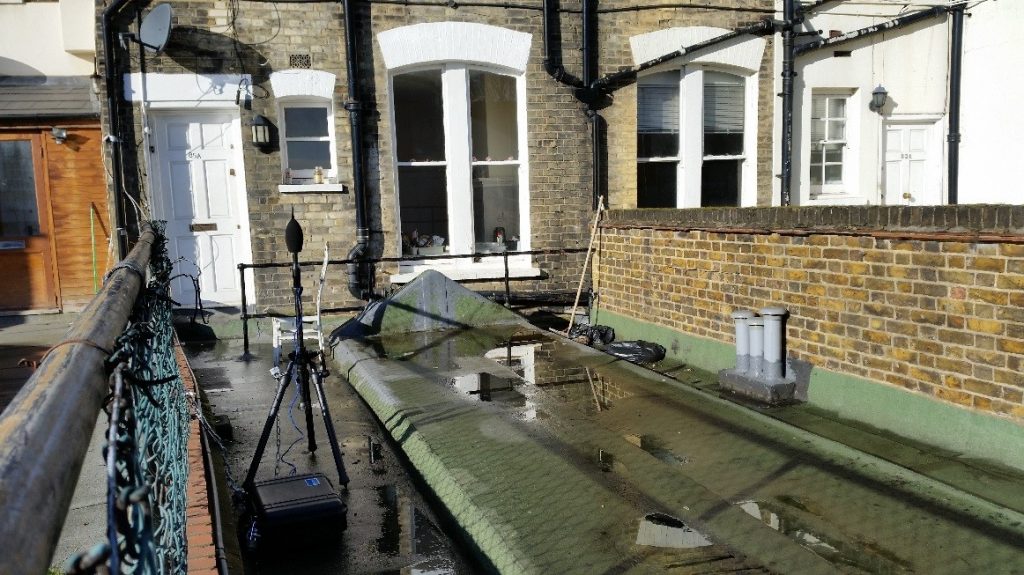
Environmental Noise (BS 7445)
This standard serves as a guideline for the necessary procedures and methodologies to be followed by a qualified acoustic engineer. Through BS 7445, acoustic engineers are able to perform a more accurate and traceable assessment.
Performed by experienced acoustic engineers, Sound Planning provides assessments for environmental noise.
BS 7445-1:2003 − Guide to quantities and procedures
This describes the methods and procedures that are practiced when measuring noise − it focuses on the noise of a community, individuals or both.
Results are shown corresponding to the constant A-weighted sound pressure levels. In accordance with BS EN 61672:2003 sound level meters should be a minimum Class 1 or Class 2 and should be adjusted according to the orders of the manufacturer; field calibration should be observed at least before and after each measurement.
BS 7445 also provides advice on selecting the appropriate parameters when recording different types of noise.
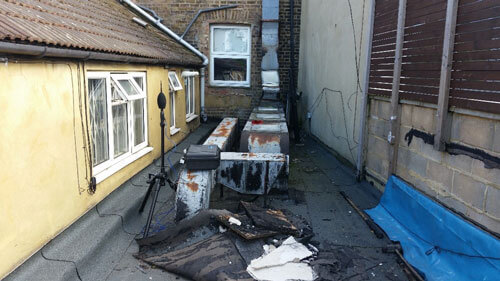
Commercial / Industrtial Noise (BS 4142)
Noise can be a big problem for many people − it can be the reason for stress and unproductive operations. It might even be the cause of financial penalties to some businesses.
BS 4142 assesses the potential impact of industrial/commercial noise on residential (noise-sensitive) dwellings. It is established to assess several sources of noise − from a single AC unit to large installations like an oil refinery; it also evaluates the effects to the people nearby, along with the associated risks that can be minimised.
Acoustic instruments have changed a lot since the last 1997 revision. The latest editions consider the advances in technology, which can help to improve the accuracy of final assessments.
According to the BSI (British Standards Institution) group, many sections of the standard have also been revised to improve clarity:
> Helps assess sound levels at proposed new residential premises
> Enables the investigation of complaints by determining sound levels
> Reduces the likelihood of financial penalties
> Supports the current UK planning guidance and Environment Agency guidance
Guidelines for commercial or industrial noise with no distinguishable features
> A significant adverse impact is said to occur if the commercial/industrial noise reaches up to 10 dB or if it is much higher than the background noise level. This kind of situation is reasonably acceptable
> Commercial/industrial noise should be avoided if it reaches 5 dB or much higher than the background noise level
> Normally, it is acceptable if commercial/industrial noise is lower than the background noise level
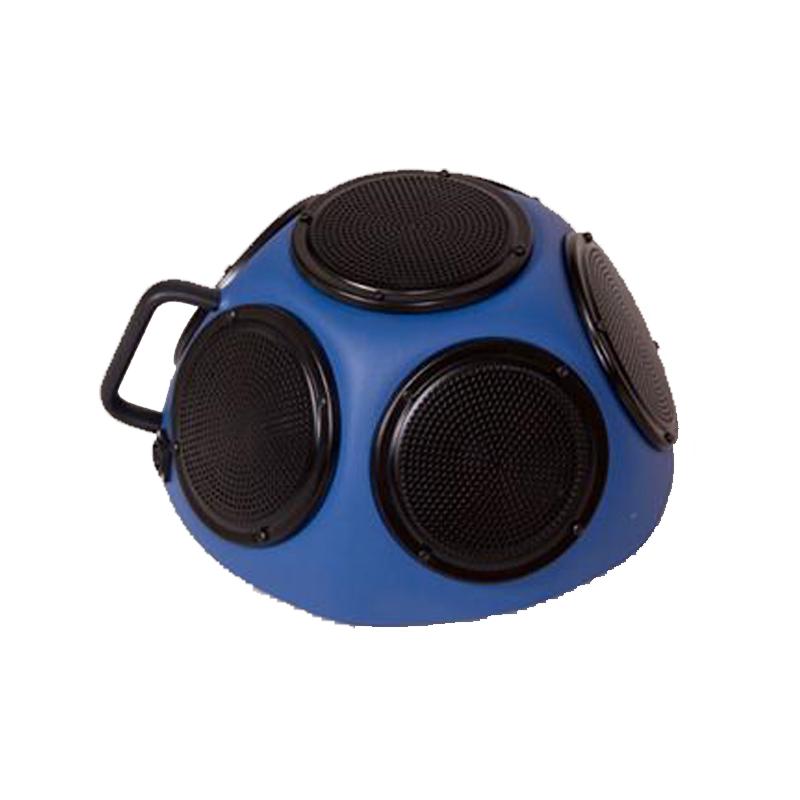
Sound Insulation Test (Building Control)
Separating floor noise tests for mixed commercial (ground floor part) and residential (above area) properties, we can also provide advice on appropriate construction specifications if required.
Importance of Sound Insulation
Noise can be very unsettling and disturbing; most buildings in the UK are in need of sound insulation as a mandatory requirement because:
> It can bring peace and comfort
> It helps stop voice leaks
> It prevents further noise inspections
> It increases privacy
> It stops airborne sounds
> It helps to avoid flanking transmissions
> It helps to prevent impact sounds
> It promotes human health and safety in commercial and residential areas (in accordance with WHO 2000 guidelines)

Vibration Assessment (BS 6472)
This British Standard provides an overall guide to those who are exposed to building vibration with the frequency of 1 Hz up to 80 Hz.
BS 6472 explains the application of weighting curves, blast-induced vibration and the current methods of assessing continuous, intermittent and impulsive vibration; it also offers guidance on vibration conditions.
Perhaps the most commonly used for environmental vibration assessments, this Standard is commonly used to assess the vibration caused by railways.
Sound Planning provides vibration assessments based on this standard. We provide consulting support throughout the UK to ensure that you conform to government regulations with regards to the environmental impacts of vibrations.
Scope of BS 6472-1:2008
> Application of methods of measuring and evaluating vibration
> Guidance when it comes to predicting the human response to vibration with a frequency range of 0.5 Hz to 80 Hz
> Advice on measurement methods to be employed
> Methods of assessing continuous, intermittent and impulsive vibration
> An acoustic engineer can determine the VDV from frequency-weighted vibration measurements
> Guidance on how people inside buildings respond to building vibration
Vibration Sources other than Blasting:
External sources
> Forging
> Presswork
> Construction work
> Demolition work
Internal sources
> Lifts
> Air-conditioning or ventilation plant
> Heavy office machinery
> Appliances like vacuum cleaners or washing machines
> Door slamming
> Human induced vibration source
> Walking at a steady pacing rate
> Running
> Jumping up and down
> Dancing with music
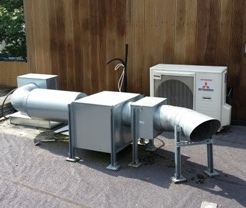
Noise Assessment
Our noise consultants are full members of the Institute of Acoustics (M.I.O.A).
For all noise assessments we use Type 1 Sound Level Meters and Accelerometers − UKAS calibrated for the highest accuracy required for environmental noise monitoring & vibration measurements.
We are experienced in liaison with Local Planning Authorities and Environmental Health Teams improving the likelihood of a successful resolution to the noise problem.
Full scientific acoustic reports issued for all noise assessments:
> Industrial Noise Affecting Residential Dwellings (BS 4142: 1997)
> New Dwellings Brought to Noise (PPG24/National Planning Policy Framework 2012)
> Noise Insulation Scheme Design (BS 8233: 2014)
> Noise at Work (Noise at Work Regulations)
> Sound Insulation Tests (Building Regulations ADE 2000)
> Sound Insulation − Site Visits/Specification/Reports
> Noise & Vibration Assessments (BS 6472)
> Plant Room and Enclosure Design (Acoustic Enclosures)
> Entertainment Noise (IOA/DEFRA/NPPF/WHO 2000)

Acoustic Fence Consultancy (WHO 2000)
Benefits of an Acoustic Fence
> Helps to reduce traffic noise
> Serves as a noise blockade between you and the noisy neighbourhood
> Minimises the noise coming from playgrounds, parks, yards or playing fields
WHO 2000 Guidelines for Community Noise
As the World Health Organisation suggests, the control for environmental noise has been hampered by insufficient knowledge of its effects on humans and of exposure-response relationships, as well as a lack of defined criteria.
About 40% of the population of the European Union countries is exposed to road traffic noise; about half of them are exposed to transport disturbances.
Community Noise
Other terms for community noise include:
> Environmental noise
> Residential noise
> Domestic noise
The main sources of community noise include:
> Road, rail and air traffic
> Public works
> Neighbourhood
Main indoor sources of noise include:
> Ventilation systems
> Office machines
> Home appliances

Entertainment Noise (DEFRA, IOA ETC)
Good Practice Guide on the Control of Noise from Pubs and Clubs
This applies to both internal and external noise events; it mostly targets entertainment venues that operate twice or more a week. The code also provides different suggested regulations depending on the recurrence of entertainment events and certain noise parameters.
According to the Department for Environment, Food and Rural Affairs (DEFRA), issues relating to Pubs and Clubs include:
> Entertainment noise
> Crowd noise
> Noise coming from mechanical services equipment
> Noise coming from deliveries
Entertainment Noise Assessments:
> Background noise measurements (1/3 Octave)
> Entertainment noise measurement or prediction (1/3 Octave)
> Noise mitigation measures
> Acoustic report
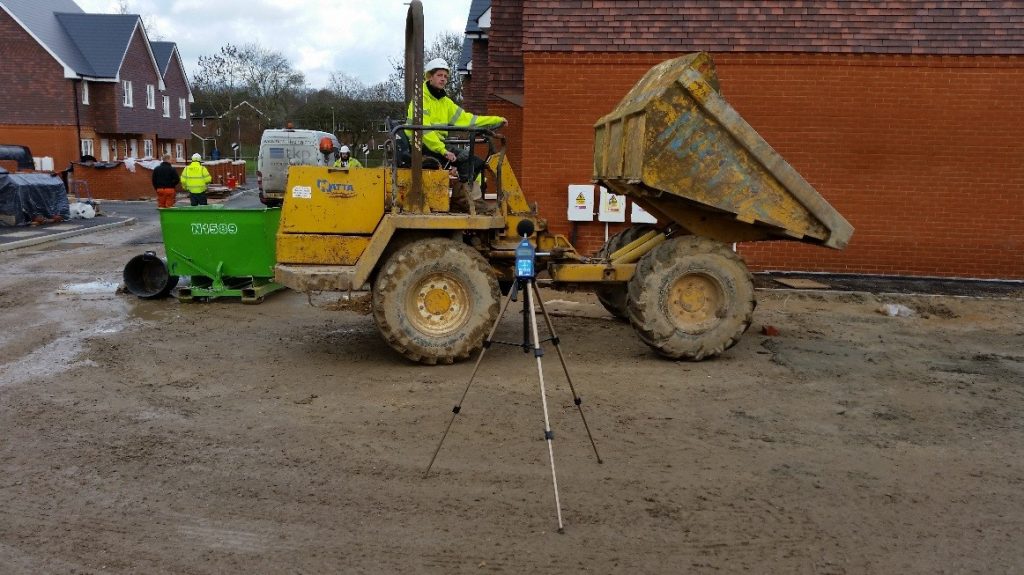
Construction Noise (BS 5228)
This British Standard endorses methods for noise and vibration control during construction operations, including procedures that aim to assist acoustic engineers, architects, contractors, site operatives, developers and planners.
The following principal changes have been applied to the British Standards:
> Restructured into two parts −noise and vibration
> Updated information relating to legislative requirements
> Updated information relating to methods and equipment
About us
We predominantly cover both London and the South East of England, however, Sound Planning provide a noise consultancy and noise assessment service with the rates being competitively priced throughout England, Wales and Scotland.
Liasing with local authorities on behalf of clients, Sound Planning discuss the noise, sound and vibration levels with planning officers and environmental health teams when building or houses near industrial areas.
Environmental Noise Assessments:
- BS 4142 Noise Assessment - Industrial noise affecting residential areas
- BS 5228 Noise Assessment - Construction noise
- PPG 24 Noise Assessment - New dwellings near noise
- BS 8233: 1999 - Internal noise levels due to external noise
- BS 6472 -- Human response to vibration in buildings
Each noise assessment will be undertaken by fully qualified acoustic engineers; adhering to the relevant British Standard or guidance from the Local Planning Authority.
We then issue comprehensive acoustic noise and sound report, analysing any environmental noise problem and formulating a viable noise mitigation strategy when required.
In addition to our assessments, Sound Planning design, supply and install acoustic enclosures for both domestic and commercial heating systems, ventilation units and air conditioning equipment where noise can be an issue.
Typical Noise Related Problems:
- Air Compressors
- Air Conditioning External Condenser Units
- Air Source Heat Pumps
- Chillers
- Fans
- Generators
- Industrial Plant
- Motors
Our acoustic louvres range can be of benefit for projects requiring an attenuated air flow. From HVAC systems, generator enclosures and engine test cells to kitchen extraction systems, workshops and server rooms.
Images














